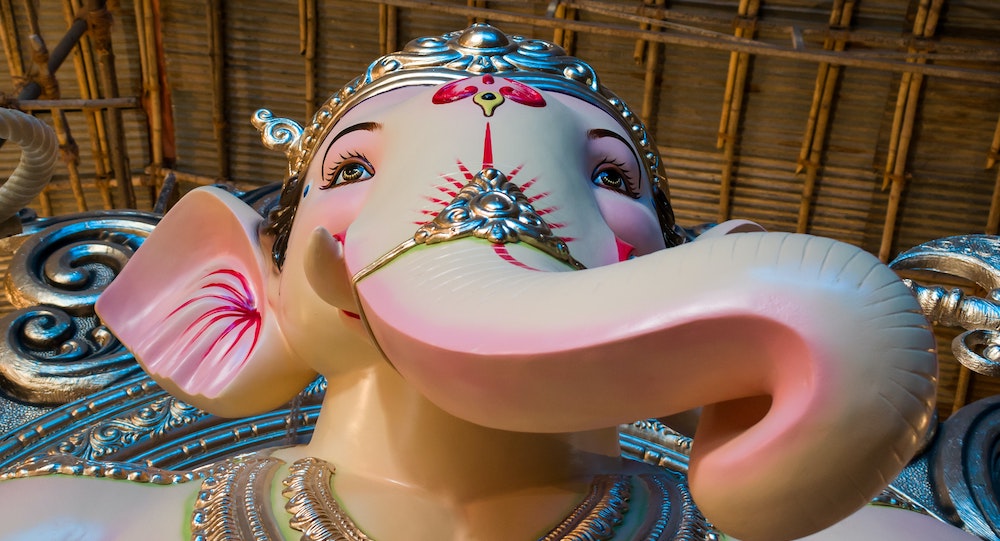Hinduism is perhaps the world’s oldest “religion,” but it would not even be fair to label it a religion, since a set of beliefs is more accurate.
In India, there are more’ religions’ and more than 300 million gods than in the rest of the world combined.
This is because Hindu or Vedic doctrines celebrate any being’s inherent divinity, and accept that many gods, and many realities, should co-exist together instead of imposing a single reality on all. It is also a faith in which both gods and goddesses appear to be more at home in acid blotter art than Westerners prefer to think of as a “religious” world in everything.
Are you interested in meeting some of the weird Hindu gods?

Do you want to find out weird Greek Gods? We covered them too.
Ganesh
Ganesh is the world’s most famous deity but also one of the weird Hindu gods. The son of Shiva (below), Ganesh has an elephant’s head—and his position is the Lord of Obstacles. At the beginning of any endeavor, Ganesh is prayed to, and if a devotee faces insurmountable difficulties in their lives or “gets stuck,” that’s when the Elephant Lord will come to clear the way.
Shiva
Shiva is the Lord of Yoga has not only invented the practice of yoga, but he is also the greatest practitioner in the world. He is also referred to as Shiva the Destroyer, and with the fire of his yogic devotion, he kills false, unenlightened, ignorant consciousness.
Shiva is a sign of raw, indistinct consciousness in several respects. He sits on Mount Kailash in his home, where he embraces yogic bliss, playing his holy games (lila) with his son Ganesh and his wife Parvati, and the periodic joint games with him.
Kali
Kali is the Goddess’s most wrathful feature is the archetypal feminine power of shakti, celebrated in Hinduism. She is wrathful to her rivals, and protective and intensely loyal to her devotees.
In one way, Kali is the power that annihilates everything. She is often also portrayed severing Shiva’s head, for her typical task is to destroy the greatest adversary of humanity—the ego. Call upon the Wrathful Mother when everything that fails.
Durga
Durga the wrathful mother is another element, just somewhat less intense than Kali. She is a protective mother who vows to make her devotees rise up and face them against all the troubles in the world if only they have the strength.
She’s riding a tiger, and maybe she should think of herself as a fierce Hindu mom or aunt who drives in to take care of business.
Lakshmi
Lakshmi, one of the weirdest Hindu gods, is an ever-popular goddess as she rules over riches and money. The Hindu god is prayed to by those in situations of financial distress, often portrayed dispensing gold coins from her palm. But material wealth is only the tip of the iceberg.
Lakshmi strives to have more than all the fleeting, intangible, and essentially worthless wealth of the universe with divine wealth and the true blessings of inner realization.
Vishnu
Vishnu is the Preserver form, with Shiva, a three-element deity. Shiva kills, produces Brahma, and maintains Vishnu; they build, sustain and ruin the world together, keeping it new and in constant motion. Not only does Vishnu preserve the world, but he also preserves dharma, or righteous, dignified conduct.
Krishna
Krishna is the god of ecstatic love, the supreme playboy who, with his mystic intelligence and epic flute playing, lures the maidens of the earth into his divine play.
He is the lord of bhakti and devotional yoga, and in order to get closer to Krishna and become drunk by his existence, his followers may be seen playing music, singing, dancing or singing.
Agni
The literal Sanskrit term for fire, Agni, not unexpectedly, among the ancient Hindu gods and goddesses, is the greatest fire deity. To that end, as indicated by the number of hymns devoted to him in the Rig Veda, it has been proposed that Agni was probably the second most powerful of early Indian gods (after Indra).
Interestingly enough, with its vital position in the numerous yajnas, fire is still fundamental to the theme of Hindu worship (rites). And Agni symbolized other types of energy in the ‘atmosphere’ well above his element of fire in the earthly realm, like both lightning and the sun.
Conclusion:
Hindus accept that God is the One without a second, the pure, formless, and only truth known as Brahman, the Ultimate, Eternal Spirit, at the most basic level. The world and everything in it is Brahman. There is no form and no limits to Brahman; it is Fact and Truth.
Hinduism is, thus, a pantheistic religion: it equates the world with Heaven. However, the Hindu religion is also polytheistic: inhabited with countless gods and goddesses that represent elements of the one true Deity, empowering people to worship in an unlimited number of forms dependent on family culture, community, regional traditions, and other variables. So there can be many Weird Hindu gods.
You may love Weird Aztec Gods if you are interested in mythology.
